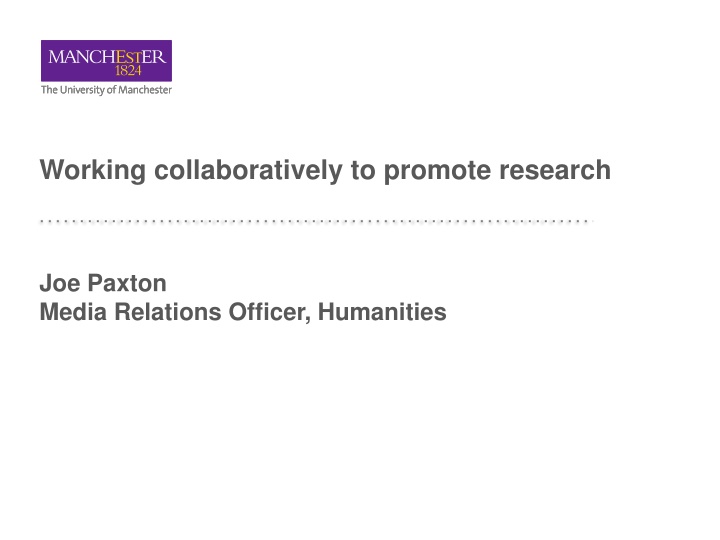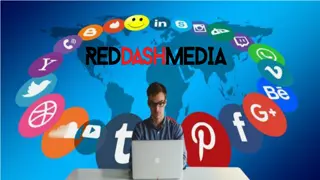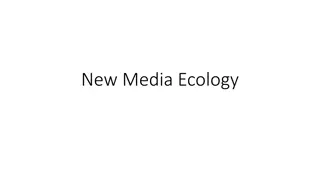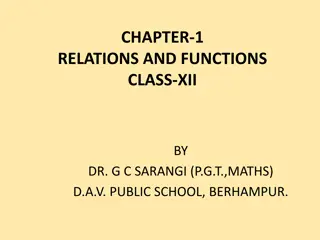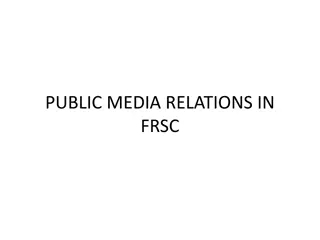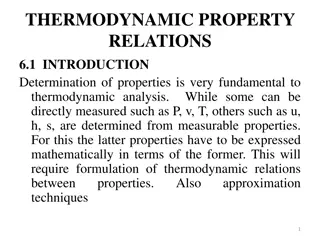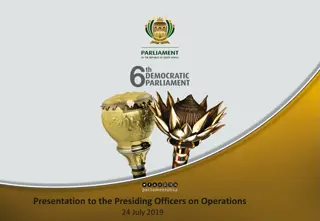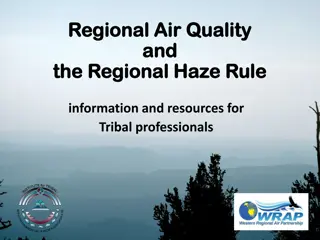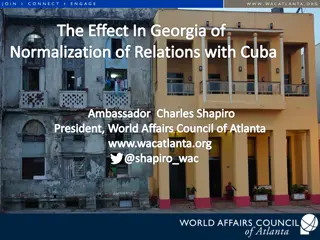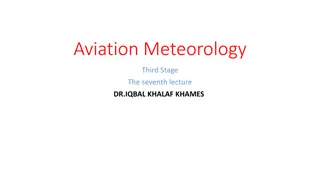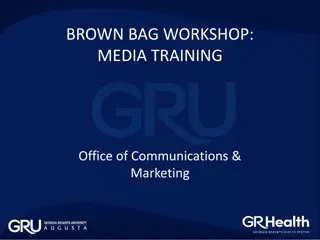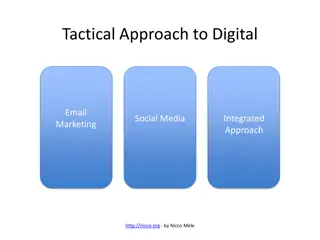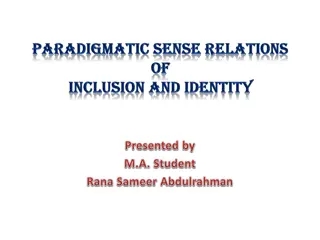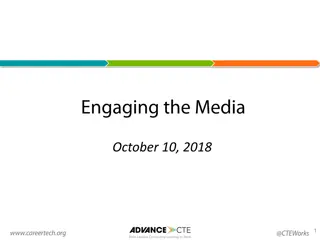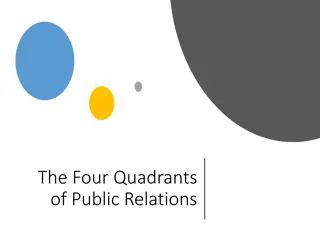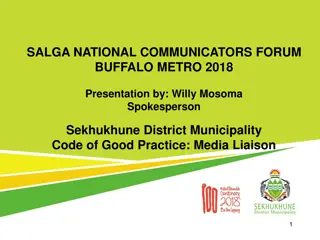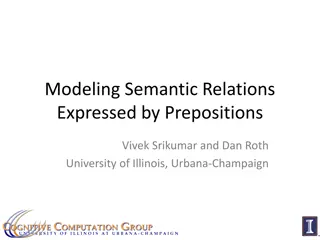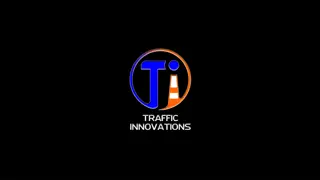Enhancing Research Visibility Through Media Relations and Collaboration
Working collaboratively with Media Relations Officers and utilizing social media can significantly boost research visibility and impact. Understanding what makes a good story, engaging with various media platforms, and presenting research in compelling ways are key strategies highlighted in the content to promote research effectively.
Download Presentation

Please find below an Image/Link to download the presentation.
The content on the website is provided AS IS for your information and personal use only. It may not be sold, licensed, or shared on other websites without obtaining consent from the author.If you encounter any issues during the download, it is possible that the publisher has removed the file from their server.
You are allowed to download the files provided on this website for personal or commercial use, subject to the condition that they are used lawfully. All files are the property of their respective owners.
The content on the website is provided AS IS for your information and personal use only. It may not be sold, licensed, or shared on other websites without obtaining consent from the author.
E N D
Presentation Transcript
Working collaboratively to promote research Joe Paxton Media Relations Officer, Humanities
Media Relations and Social Media - Each Faculty has a dedicated Media Relations Officer, who sits in the central Communications & Marketing Team I am yours! - Social Media Officer Patrick Crich is also part of our team - We work together with colleagues across the Faculty and its divisions to promote your research to journalists and the public
The media - Traditional media print and broadcast - Online media eg The Conversation (more on that later) - Social media - Blogs Engaging with them is good for: - Impact - get your work noticed & improve Altmetric scores - Funding - funding bodies like publicity - Collaboration - fellow academics follow the media - Reputation - builds the University brand
What makes a good story? To grab the attention of journalists, news stories need to stand out - - Groundbreaking/new research - Research which will have a real impact on people - Quirky subject matter - Presented in a clear/standout way, for example through usage of graphics
Life on the line This story about life expectancy levels in Manchester became one of our top stories of last year, thanks to Kingsley Purdam s use of the Metrolink graphic to plot the data. This is a great example of a researcher thinking beyond the press release to present their findings.
I have a good story what should I do? Contact Media Relations, Lynda McIntosh or your Institute manager (do this as early as possible so activities can be planned in advance) Bear in mind that it is difficult to write a story from a research paper alone, so please provide the following: - A simple layman's terms outline of your research - Why you have undertaken it - What impact it could have on your area of research or wider society - A two or three-line quote
Join The Conversation The Conversation is an independent source of news and views, sourced directly from the academic and research community. Their articles are republished by the mainstream press, and can lead to much higher levels of visibility for research. We have recently become a full paying member, giving us access to daily expert requests and various editors who are looking for academics to comment on newsworthy stories.
A recent example: This article was written by Psychologist Cary Cooper. The Conversation published it
and it was then picked up by 9 other websites including The Independent, World Economic Forum and Business Insider UK.
It ended up getting a total of 19,347 reads from countries across the world the top ten are pictured here.
Writing for The Conversation It s extremely easy to register just a quick online form and you re ready to go. The Conversation are happy to offer training on how to write for them they can do this either remotely or in one-to-one sessions. Just speak to me if you d like to know more.
Contact me - joe.paxton@manchester.ac.uk - x58155 - LG020, John Owens Building
How to get your research into the media Wednesday, 11 April 2018 Lynda McIntosh Research Communications and Marketing Manager Faculty of Humanities
Why does the media want to know about your research? You have something they want: Solutions to a problem New way of doing something Original content Expertise - you know more than their readers Credibility
Why should you engage with the media Possibly the best most effective way to communicate with the public The more controversial the topic, the more important it is for the public to hear from the most qualified experts. A quote from you in The Sun, The Times, the Daily Mail and The Guardian would reach an audience of over 13 million (based on National Readership Survey 2013/14). If you don t speak, someone else will and they may not be as knowledgeable When a story breaks, you often only have one chance to get accurate, evidence based information across. http://www.sciencemediacentre.org/wp-content/uploads/2013/08/SMC-Why- Engage-2015.pdf
Who is your target audience and what interests them? Policymakers/government departments Research councils/ funders Academics/project partners internal and external to UoM Stakeholders within The University of Manchester Media (traditional) Bloggers and online media Think tanks/NGOs/civil society General public Students (prospective and current) Cultural institutions/organisations Professional societies
A reputation for excellence As a Faculty we will: Promote Humanities activities locally, nationally and internationally by clearly articulating our activity and celebrating our distinctiveness; Develop clear and concise messages which will be used in all of our communications and marketing material; and Support the University in its goal of identifying key external stakeholders and policy makers. (Faculty of Humanities Strategic Plan 2020) Great reputations are created by great outputs!
How do I get my research into the media? Let us know when a paper is going to be published earlier the better! Send a copy of the accepted paper with 3 highlights or key messages Think about external news hooks (anniversaries, international days, current news agenda) Plan social media promotion of the article Interviews tell us if you are available to speak to the media https://www.elsevier.com/editors-update/story/practical-tips/10-tips-on- working-with-the-media
Our channels - StaffNet, News Digest and UoM Magazine
Dont forget to raise your profile internally HumsNews (Faculty of Humanities weekly e-newsletter) StaffNet (The University of Manchester daily posts) eUpdate (The University of Manchester weekly e-newsletter) Send your news to Karen O Rourke at humsnews@manchester.ac.uk and she will help you draft content for HumsNews, HumNet, or StaffNet.
Blog about your expertise Manchester Policy Blogs Guardian Blogs The Conversation Huffington Post Trade press (The Grocer, ESRC newsletters) In-house magazines, School newsletters Stakeholder magazines (ESRC s Society Now, Discover Society) Specialist press Consumer press Weekend magazines and supplements (local, regional and national press)
Tips for working with the media be a source of information Learn the specialist journalists in your field Build relationships with journalists Contact them either in person or on social media Cultivate a reputation as someone who is responsive BUT Don t feel pressured to say anything outside your area of expertise Provide clear information, links to original research, images, videos, and let the journalists do the writing
7 actions within next 6 months 1. Write a list of keywords related to your areas of expertise send them to us 2. Update digital profiles - profiles in Pure, Google Scholar and social media 3. Practice developing 2-3 key messages for each research output 4. Tell the Media Relations team when a paper is accepted for publication 5. Read news in a variety of formats to learn styles (and audiences) of various publications 6. Identify the specialist journalists in your research area pick one to contact 7. Think about alternate channels such as social media, Sunday features, in- house newsletters, websites and blogs.
How we can support you now Ask us questions clinic later today Join the Research Communications and Marketing Network Training sessions digital skills, writing, social media campaign planning Send us the list of keywords related to your research Tell us if you re willing to speak to the media we ll keep you in mind www.brand.manchester.ac.uk and http://www.brand.manchester.ac.uk/marketing-support/brand-toolkit/ Develop stories for HumsNews
You arent doing this alone were here to help News releases (for national and international press) Press conferences Informal media briefings Setting up exclusive interviews Photo calls Help with media contacts in your field Media training
Happy to answer questions! If you have any questions about getting your work into the media, please email: lynda.mcintosh@manchester.ac.uk Lynda McIntosh, MCIPR Research Communications and Marketing Manager Faculty of Humanities, The University of Manchester
https://www.ofcom.org.uk/__data/assets/pdf_file/0016/103570/news-consumption-uk- 2016.pdf
